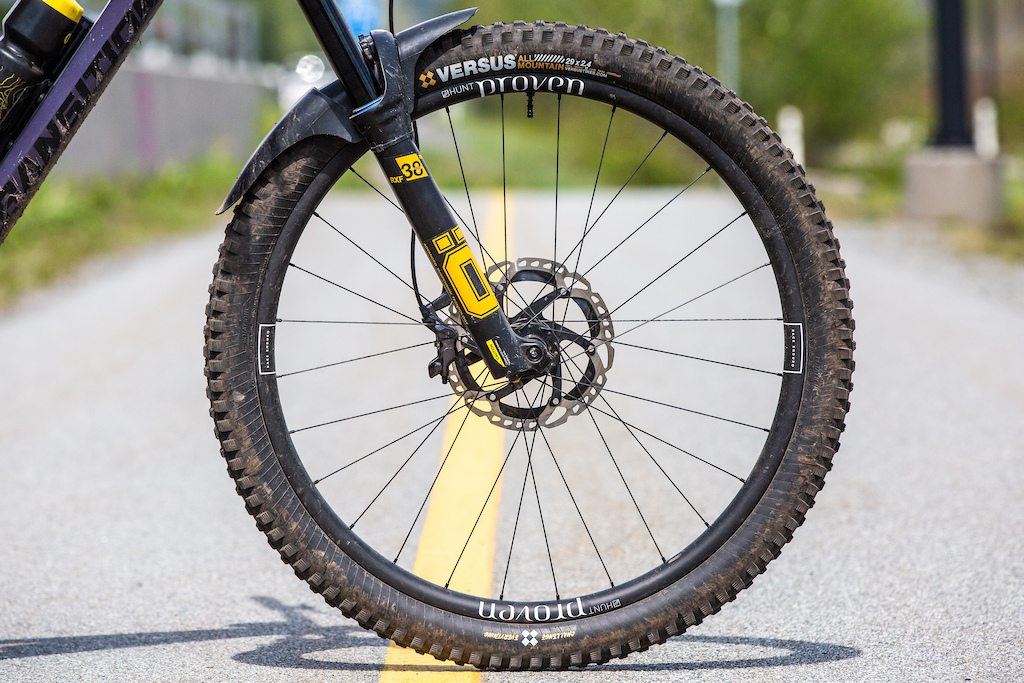
• Wheel size: 29″
• Intended use: Enduro
• Rim material: Front & rear specific carbon layups
• Rim width: 30mm (internal)
• Hubs: 5° RapidEngage
• Weight: 1929g total
• MSRP: $1,266 USD
• More info: www.huntbikewheels.cc
In some ways, the Proven Endruo wheelset, which also have an XC counterpart, are a good reflection of where the carbon-wheel debate is currently at. Yes, you can make a carbon wheel very light, but to only pursue a low rim weight wouldn’t be to explore the full landscape of potential benefits.

If you ask your average mountain biker about their thoughts on carbon wheels, the word “failure” might just come up, and it’s not without good reason. When carbon wheels used to fail, which is thankfully a far less common occurrence these days, the result would often be a spectacular explosion, rather than the dinging or bending you might see on an alloy rim of similar quality. However, over the past decade or so carbon wheels have arguably become more reliable than alloy offerings, and that’s for several reasons.
Firstly, it’s more common to see a carbon rim suffer enough damage to warrant a replacement without shattering like glass. Carbon wheels aren’t vulnerable to dinging or dents. As somebody that quite often dings alloy rims, it’s nice to have a wheelset that is quite simply good or it’s not, without having to question whether one, two or three dents are enough to warrant replacement. It also seems that more and more carbon wheels aren’t hamstrung by having to be light, and more brands are making heavier, racier and more durable wheels. Hunt are by no means the only brand to explore the idea of burlier and more durable carbon rims. You only have to see World Cup riders’ bikes, where racers can go a whole year without so much as breaking one single wheel (Pinkbike Racing’s Ben Cathro did three seasons on one set of Reserve rims before putting them out to stud).
This divergence of what a carbon wheel should be was a long time coming. Yes, there are some people that may well see carbon rims as a gateway to reduce the weight of their XC bike, but I think for most riders and racers, we just want something strong and reliable. This distancing from the ideal of low weight has also led designers to explore another property of carbon wheels – their comfort. You can, of course, find many alloy wheels that are comfortable. The issue isn’t so much if it can be done with anything other than carbon, because of course it can, but rather how that comfort is balanced with lateral stiffness. Last year I reviewed the Trail Wide V2 wheels from Hunt. While they were very comfortable, and were 200 grams and half the price of the Provens, when you pushed the bike into turns they did feel more vague on the front and flexier on the back.
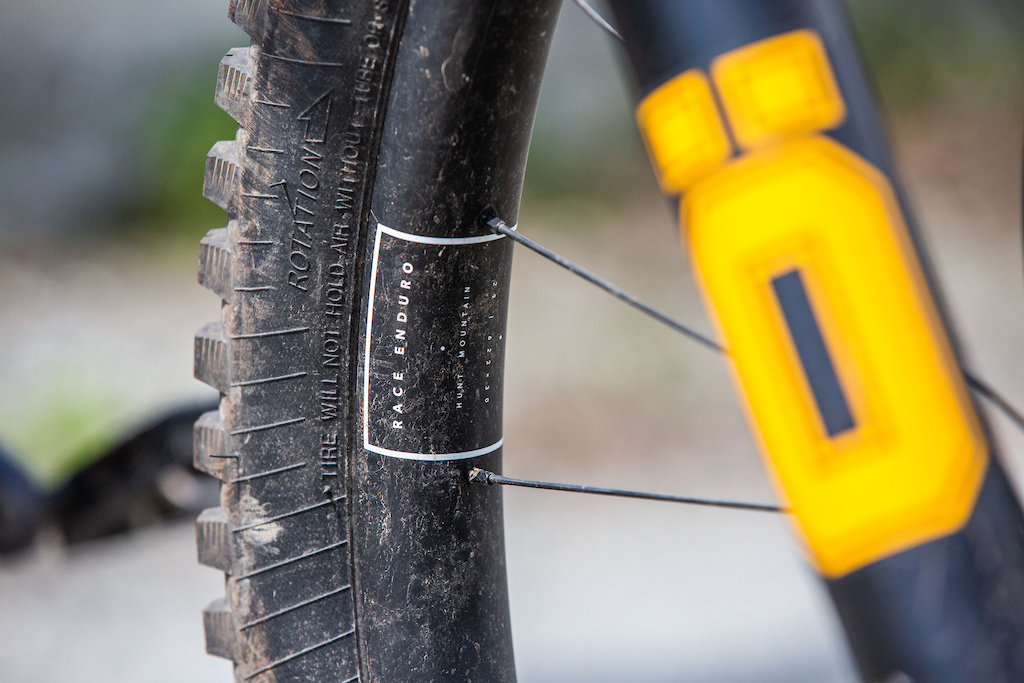
Design
The wheels use front and rear-specific carbon layups and spoke gauges. This is all to try and give the front and rear wheels different qualities, and let them play and do what is demanded of them. The front’s design and build puts a greater emphasis on comfort and compliance, whereas the rear is meant to be more impact resistant.
Hunt oftentimes publishes their internal testing data from their self-made jig. In the instance of the Proven enduro wheels, they show that they’re the most impact-resistant wheel they’ve ever made, as well as beating some other notable industry competitors. However, by their own admission, they weren’t able to make it quite as resilient as the Reserve 30 HD wheels.
The rims use a 30 mm internal width and a 37 mm outer. Their 23 mm profile does make them relatively shallow. This, I would imagine, is interlinked with compliance. Both wheels use 28-hole rims. However, the front uses a more flexible 1.6 mm central diameter spoke, whereas the rear uses a slightly larger 1.8 mm. The rims are intended for tires between 2.35″ and 2.6″. The front hub uses a 6061-T6, and the rear a 7075-T6 alloy. Both use Revo bearings with full contact seals with extra thick 17mm axles. The engagement of the freehub is 5 degrees.
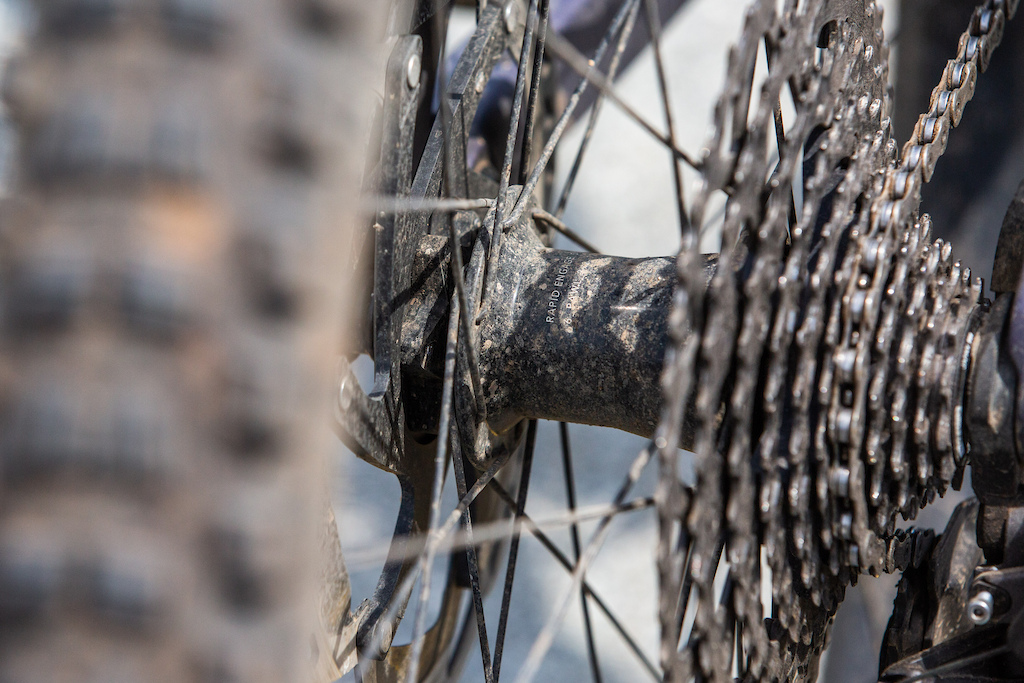
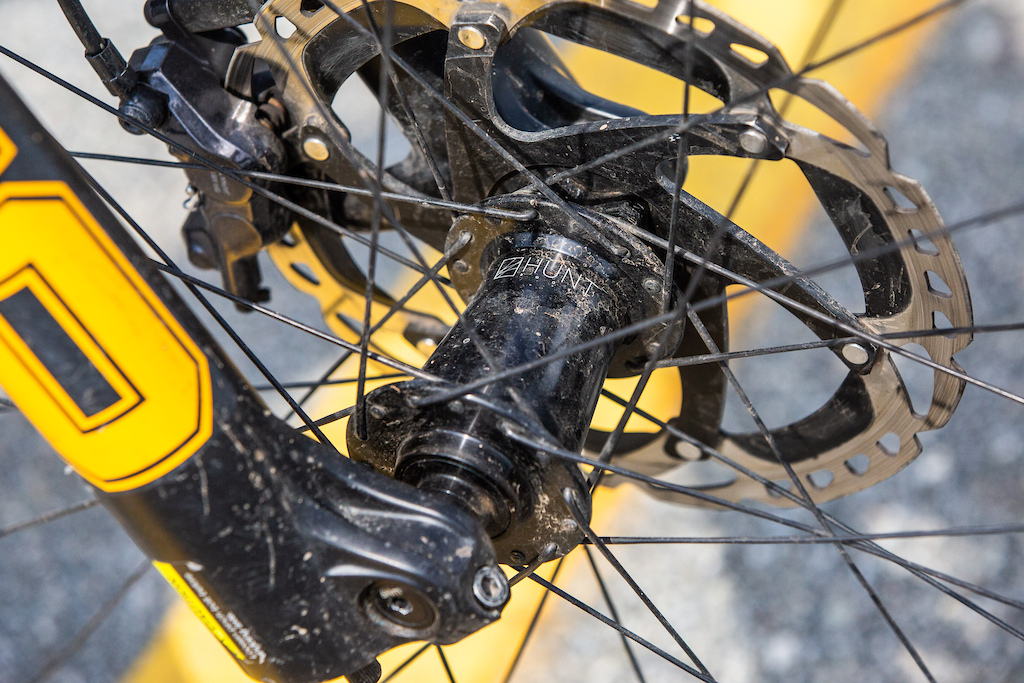
Test Setup
During testing, I ran these rims with and without inserts, and with several different tires. A great deal of time was spent on Vittoria’s new Mazza Enduro Casing tire (around 1500g), a Mazza and Martello combination in their trail casing with DH inserts (950-1000g with Rimpact Pro in the Front and CushCore Pro in the rear), Continental’s Krypotal range in their downhill casing (around 1200 g), as well as Versus All Mountain tyre in both the Gravity and the Trail casing (1500 and 1050 g respectively).
Pressures varied a lot. In the heavier tires, I ran as little as 22 psi in the front and on the lighter tires as much as 26 PSI. My rear pressures varied, too, going between 25 and 30 psi. I spent a great deal of time on these wheels in the mountains and volcanos of Patagonia, and then riding around Squamish. To say these wheels have seen their fair share of rocks would be a drastic understatement.
On the Trail
The Hunt RapidEngage hub did all that was asked of it. I think 5 degrees is very respectable and is very adequate for my intentions.
The wheels offer compelling claims about comfort, so how does that stack up on the trail? Well, honestly they’re pretty good. That said, they’ve very much within similar realms of comfort to other wheels. However, there are three things that set the Hunt Proven apart – they’re stiffer and more impact resistant than alloy wheels that offer a similar level of comfort. They’re more comfortable than wheels that can shrug off the same type of hits, and finally, while I acknowledge that there are other carbon wheels that can offer these traits, I would say the Hunt manages to include them in a far better value package.
My personal preference for wheels, and it should be noted that I like riding natural, fast turns and off-camber tech more than all-out braking bumps, questionable hucks and bike-park chunder, is a lower spoke count and a laterally stiffer rim. I have found that this setup tends to bleed into my desired traits for a wheel.
The front wheel does track well, and I look forward to coming back with more data and comparison as I conduct a compliance test on several wheels that claim to have comfort at their core. The Hunt Proven wheels were a wheel that just blended into the bike, and I never suffered any fatigue due to a harsh, rigid feeling front end. In fact, I would say these wheels deliver the comfort of the Trail Wide alloy wheels, with a similar weight, but the lateral stiffness of the Enduro Wide alloy wheels, which are quite a bit heavier.
Durability
I had several large impacts on these wheels, and had the rim clanging-and-banging off any number of rocks and roots, but for a long time there were no failures or burps. Before I go into the eventual failure of this wheel, I want to preface it with my thoughts and expectations around what is reasonable to expect.
Firstly, shit happens. I rode these wheels for six months, and really battered them several times, and they stayed true and intact. Eventually, I hit my rim so hard that it sliced a tire open at the tread through a Cushcore Pro insert. The sheer noise at the time made me think I’d killed the rim.
A week later, after replacing the tire, I came off a drop while I was bracketing some suspension, and I blew the rear. It’s so hard for me to say exactly what happened or be sure, but I think I damaged the wheel after the first impact, and then teased the damage out with the second. Coming off the drop, you do land in rough terrain, and as you do so you are trying to brake as you land to scrub speed. There is also a chance I just got on the brakes a fraction too early.
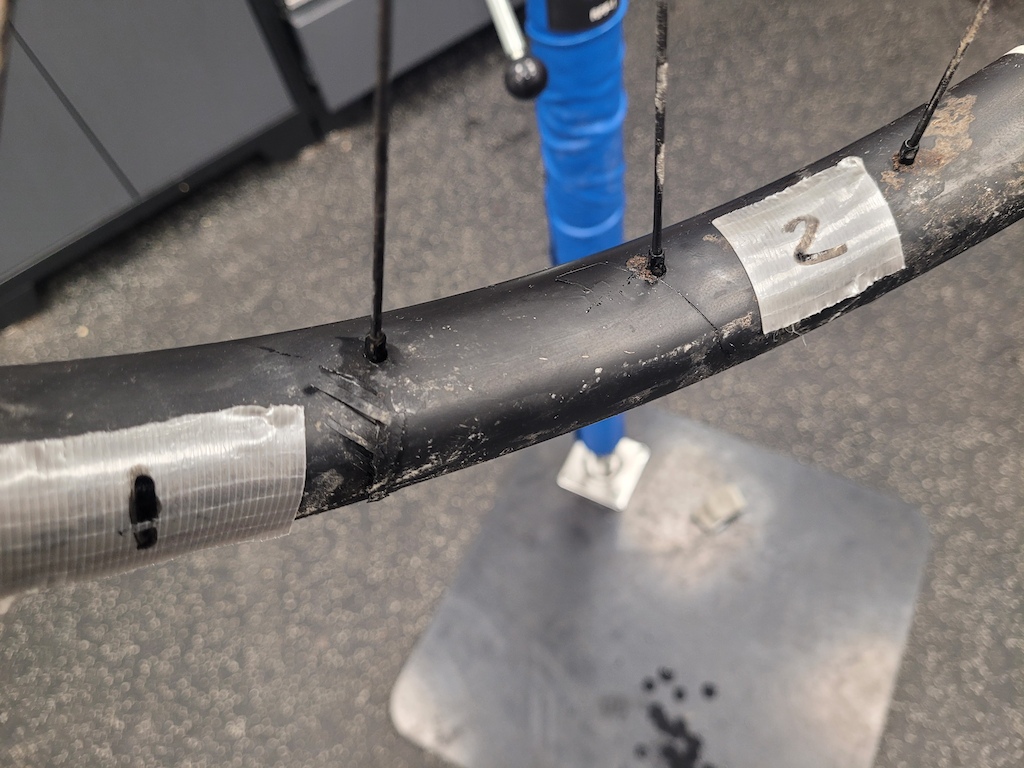
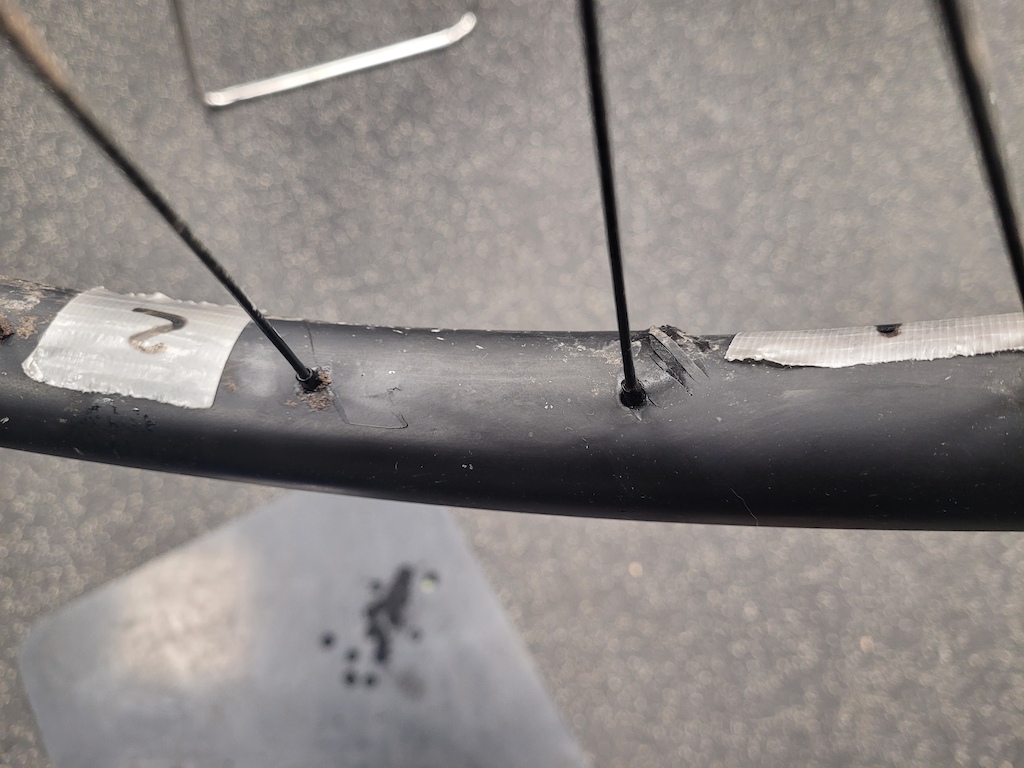
If what happened was the first scenario, then it’s actually quite an amazing thing that a rim can fail but still hold air. I’ve seen this before in E13’s range when I worked on the World Cups. One of their rim revisions made this huge leap where yes, the rim would fail, but it would almost always get the rider home. If this is the case, then the subsequent and more spectacular failure is something that could have been prevented by me checking it more stringently. However, I’m afraid to say I just swapped the tire without thinking and carried on riding.
Ultimately, it is disappointing, and calling a product line Proven is asking for trouble. I think it should be raised that oftentimes the most frustrating part of product failure is often the downtime as you wait to get your bike back up and running, no matter how generous the warranty program is. It’s also worth noting that at over 1900 grams these aren’t particularly light, which may well negate or bypass one of the main reasons to get carbon rims in the first place for some. If you’re paying more for a wheel that is heavier than it could be, it wouldn’t be an unreasonable expectation for it to not fail.
All rims break if you push them hard enough. Any World Cup team could tell you that. The H-Care policy seems quite fair too. They’ll either send you a new rim and pay your local bike shop’s labour, or you can send it back to be relaced. For what it’s worth, I enjoyed my time on these wheels and, despite the failure, I would still say they’re a good product at fair price.
The hubs themselves on the wheels spun free and smooth for all the miles I rode on them. This is doubly impressive considering I rode them during a very wet South American spring before a long and wet Canadian winter.
+ A fair price for carbon wheels
+ A good blend between compliance and stiffness
– Rear rim failed
– Not especially light
Pinkbike’s Take

